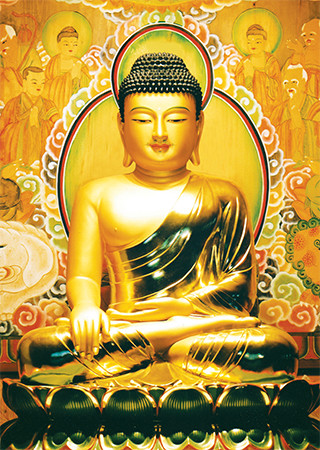통합검색
원하시는 검색어를 입력해 주세요
Write your personal practice statement.
1st 1000-Day Practice Wrap-up Period
* The page will be reset if you clear the site data (cookies).

We will begin the 66th day of the 11th 100-Day
of the 1st 1000-Day of the 2nd 10,000-Day Practice.
I pay homage and reverence to the Buddha.
I vow to become a person who is unhindered and without suffering by ridding myself of foolishness and ignorance.
I am delighted to learn the Dharma.
I vow to practice diligently with the knowledge that all my suffering is caused by my own ignorance.
I am proud to be a disciple of the Buddha.
I vow to become a bodhisattva, liberating all sentient beings from suffering.
The root of all suffering and attachments is within ourselves.
The unwise mistakenly believe that suffering and attachments come from the outside. Our attempts to find happiness and freedom by visiting various places and meeting different people are to no avail because happiness and freedom can never be found outside of our minds.
No matter what kinds of problems we may have, if we reflect deeply, we realize that the root of our afflictions is within us and that the mind itself is empty. With this realization, all of our suffering and attachments disappear right away.
When we look outwardly, our anger, frustration, hate and resentment often seem to be caused by others. However, upon introspection, we realize that those feelings arise within us because we are caught up in the notion, “I am right.”
When we realize that nothing is inherently right or wrong and things are just different and let go of the thought, “I am right,” we will no longer have anything to get angry about or anyone to feel resentful toward.
Read today's daily reading three times.
Our modern civilization is facing serious crises. People are losing their humanity, communities are disintegrating, and the natural environment is being destroyed. We look to the teachings of the Buddha to find solutions to these problems.
We base our perspective of the world on the Law of Dependent Origination.
As this exists, that exists, and if this ceases to exist that will also cease to exist. This is the state of things as they are. Since everything is interdependent, your survival means my survival and your happiness leads to my happiness. Based on the Law of Dependent Origination, we pursue the path we can travel together in happiness. Just as a variety of flowers makes a garden, the diversity of people creates harmony and balance. We wish to build a new civilization in which love overcomes jealousy and envy; harmony triumphs over confrontation and competition; and peace prevails over conflict and war.
We take the Buddha and bodhisattvas as models for our own lives.
Following in the footsteps of the Buddha, who lived an austere life with only one set of robes and one alms bowl, we assume the mindset of a practitioner by eating, dressing, and living humbly, free from all worldly hindrances. Furthermore, we aspire to become practitioners who help those who are suffering. We vow to carry on the aspirations of the Mahayana bodhisattvas who embraced the suffering of the world as their own and willingly cast themselves into the world to save all sentient beings.
We uphold the principles of non-ego, non-possession and non-obstinacy in our practice.
By changing our perspectives and freeing ourselves from our obsessions, we vow to surrender our egos, possessions and obstinacy to become bodhisattvas who solely cater to the needs of sentient beings. By changing our mindset, we aim to become free of attachment and suffering.
Furthermore, we vow to overcome the crises our civilization faces by creating Jungto, a world in which individuals are happy (pure heart), communities are peaceful (good friends), and the natural environment is preserved (a clean Earth).
1. We free ourselves from suffering and serve our neighbors and the world.
2. We practice, donate and volunteer online from our home, our individual place of practice.
3. We cultivate Jungto practitioners by running the Jungto Dharma School worldwide.
4. We actively engage in spreading the Dharma to young people and to people worldwide.
5. We promote happiness for all human beings by running the Happiness School programs worldwide.
6. We contribute to world peace by establishing peace on the Korean peninsula.
7. We promote a frugal lifestyle to overcome the climate crisis.
8. We expand our effort to eradicate poverty, disease, and illiteracy.
9. We engage in initiatives that benefit local communities to help create a happier world.
10. We create a new civilization where people share and support one another in solidarity.
1. I choose to be generous rather than be greedy.
2. I choose to smile rather than get angry.
3. I choose to love rather than hate.
4. I choose to understand rather than want to be understood.
5. I choose to help rather than receive help.
6. I choose to be grateful rather than complain.
7. I choose to be humble rather than be arrogant.
8. I choose to be confident rather than be servile.
9. I choose to be thrifty rather than be extravagant.
10. I choose to own my life and be happy.
I vow to build Jungto, a land where no sentient beings suffer.
I vow to end all suffering and afflictions through practice.
I vow to learn all of the Buddha’s teachings.
I vow to attain Buddhahood together with all sentient beings.
Recognize your state of mind
during today's practice
and write it down.

Donating more than
a dollar every day

Performing at least
one act of kindness every day
